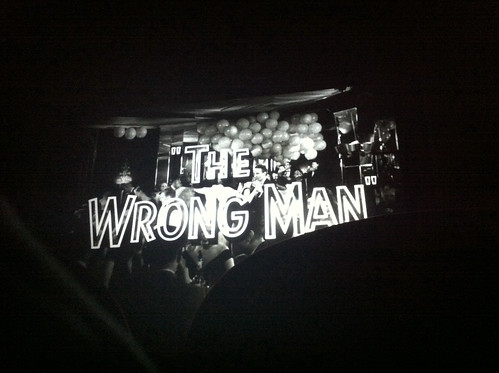Viewing Log #69: Hello stranger [1/10/11 - 1/17/11]
by Ryland Walker Knight

- Eccentricities of a Blonde [Manoel de Oliveira, 2009] All these frames—of light, of wood, of windows, of narrative—and the one that matters is only made tangible as exchange. That is, at bottom economics determine the course (already fixed, given the train that houses the story) of where such an obsession can go. Time's funny, too, in this leap-frog structure that sees daylight blink away, making the brief running time a kind of metonymy for bigger films by Senhor Oliveira; but the funniest thing is that a jig and a beard are all you need to see a man as younger. By contrast, the metonymy applied to "a blonde" and her "beautiful Chinese fan" is the saddest thing; that she's only seen for these things, that our narrator can only see these things. Her final posture of defeat—discarded like that poker chip thrown (that she stole), head hung to the floor in shadow and legs open almost in surrender—inverts her image from that sanctioned pedestal in the window, a final evacuation of the frame and of the image since we see neither her blonde shimmer nor her twirling fan. Money dooms love, indeed, as does thievery, the third metonymy at play: she stole his time, it blinked away. [Did any women write about this film?]
- Bellow [Christopher Tirrell, 2010] Watch it here. Honestly can't remember how I found this, but it was sitting open in a tab for a few days before I watched it. Certainly a fine example of a 5Dmk2 doing film-like work, though its low light images are rather particularly digital (which isn't a bad thing), making the sound a bigger part of the argument (as if the title didn't point there). In any case, I dug how obfuscating it was, how it seemed like a test was being passed but at the same time how these little compositions added up to something like an argument; an argument about the sudden rush of the world, either by accident or by necessity, and about a fire on the horizon of life, though its flames are lit not for light but for signaling. Which is to say for alerting the world to your mark, which is a funny metaphor for emulsion given this digital bend.
- Hudson Hawk [Michael Lehmann, 1991] # Some gchatting about Die Hard 2 with Haz resulted in a Bruce Willis investigation, which resulted in my giving this a go, wherein I lasted five minutes before I fell asleep.
- The Wrong Man [Hitch, 1956] Were I not so tired when I saw this, I would have more to say beyond: amazing, this is the grim kind of movie that Hitch was certainly capable of but rarely made given his love of a good joke. (Any bit of levity, no matter how brief, seems "worth it" to him in movies like, say, the Tippi two, which are often alarming but somehow not all-the-way horrifying.) That is, this flick is almost the anti-NXNW the way Fonda is some odd inverse of Cary Grant, or the way a pool of mud can reflect the sky. I'll hafta watch it again.
- Lifeboat [Hitch, 1944] I'd heard some cinephile types extol the cinematics of this one but I was always skeptical. Turns out: they were right and I was wrong! That said, this was the one I was super excited to see this last week of Hitch at the Castro. The print was in lousy condition, but the crowd was big and generally alright (some idiot snickers are to be expected) for this odd little capsule of a movie. Some of it's pat, sure, and dated; but its employment of the close-up is fabulous (punctuation, affect, a general timing device to break up the space/time) as is the relative lack of score.
- The Strange Case of Angelica [Manoel de Oliveira, 2010] Very simple, and slow, but I was charmed by its near-naive devotion to the image. That is, it almost takes on the devotion of its twin director-audience surrogate. What keeps it this side of hokey isn't just its commendable seriousness but that long scene of breakfast yacking amongst the other boarders, none of whom can fathom this young man's swing into his own head, nor his interest in certain images. Which makes me think the film is about, to a certain degree, the divide between the cinephile and the (excuse me) regular Joe-Jane voyeur: most images for most people serve strictly as a sociological referent, not a spiritual one. (Reminds me of something Ignatiy wrote about skipping a sunrise to watch a de Toth (or whatever) because we movie nuts need to see another life lived, which is of course something I've pushed back on in the past half a year or more, but also something I cannot escape. Nor should I try to mask that desire since it motivates just about any human aiming a camera to make images.) This is another way of saying we initiated always-already believe in a beyond, and we often want to join it.





As someone who has an almost irrational love for Die Hard 2 (I think it's the Indiana Jones and the Temple of Doom of the series, and about as exuberantly over-the-top and entertaining), I'm kinda interested in what you and Haz were talking about in regard to that film. (I haven't seen Hudson Hawk, however.)
ReplyDeleteJust the usual, like icicles to the eyeballs
ReplyDeleteWhat do you think a woman might take away from Eccentricities of a Blonde Haired Girl? I talked to a woman who saw the film, and we seemed to see it much the same. It's an oddly disorienting film with a peculiar depiction of its female character, for sure, and I could certainly see it striking a woman in a completely different way that it did me, but I don't really know. Every person Oliveira shows in the film has a bit of a mythical quality to them, even when there is simply a man and a woman talking to each other in a train. I think his style may create enough of a distance between the viewer and the figures in the story that most reactions would be similar, but I really have no idea. There's an odd contrast between the artifice and the setting which I can't quite explain, and I haven't felt in the few other films of his I have seen. Beguiling.
ReplyDeleteJean, I know what you mean. I'm just forever curious to hear how women react to representations of women, especially, as with this film, the woman is more an idea than a person. (Duh, that's the point, but it's still curious.) That is, there are certain women writers whom I love to read on this very topic that I would, no doubt, love to read in relationship to this film.
ReplyDeleteMainly I'm curious because the title points at a conversation about gender, and about stereotypes, and there's stuff in the film to talk about when it comes to gendered storytelling but it's also artful enough that the conceptual is subordinated to the aesthetic pleasures in a lot of passages. Tho, of course, they're always interwoven.
I think it's a slippery enough film that it may defy division along gender lines among all but the most acute eyes. It is a film very much about perception, though, so I shouldn't discount the differences in perspective.
ReplyDeleteI was puzzled by the way the uncle treated his nephew. His blatant disregard for his nephew's feelings and insistence that he not marry, without seemingly being aware of the girl in question, seemed jarringly insensitive and peculiar. If the film were entitled 'Eccentricities of a Crotchety Uncle' I would not have cried foul.